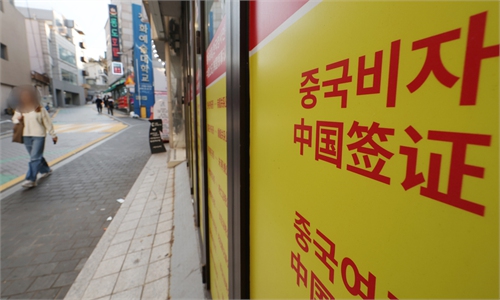ARTS / CULTURE & LEISURE
China’s visa-free policy sparks weekend getaway boom among young South Koreans

South Korean tourists pose for photos at the Zhangjiajie National Forest Park in Zhangjiajie, central China's Hunan Province, May 22, 2024.(Photo: Xinhua)
For many young people in South Korea, a spontaneous weekend getaway to China has recently become a great post-work adventure. With flights from South Korea to some Chinese cities taking just a few hours and China's visa-free policy for South Koreans eliminating the hassle and cost of visas, the demand for quick trips to China has skyrocketed.
"The impact of China's visa-free policy has been immediate, especially for the younger generation in South Korea," Kim Yeon, a South Korean tourist in China, told the Global Times.
With the visa-free policy for South Koreans sparking a surge in weekend travel to China, it has driven a sharp increase in bookings between the two countries.
Since the implementation of China's unilateral visa-free policy for South Koreans on November 8, bookings for inbound tourism from South Korea have increased by about 15 percent compared to the previous month, with a year-on-year growth of over 150 percent, according to a report by the China News Service on Monday.
Zhangjiajie, Central China's Hunan Province, with its breathtaking natural landscapes and rich tourism resources, has attracted a large number of South Korean visitors. "Filial piety" (respect, loyalty, and devotion to parents, a core value in many East Asian cultures) is highly valued in South Korea, and the slogan "To demonstrate filial piety to one's parents, take them on a trip to Zhangjiajie" is widely embraced. A combination of mountain hiking and filial piety has further catered to the interests and cultural needs of South Koreans.
"A large portion of inbound tourists to Zhangjiajie have been from South Korea since the visa-free policy was introduced," Zhang, a representative from the administration of the Wulingyuan Scenic Area in Zhangjiajie, told the Global Times.
Kim noted that due to its proximity and rich cultural atmosphere, Shanghai has also become one top choice for many young South Koreans for their weekend trips.
"With the deepening cultural exchange between the two countries, the interest of young South Koreans in China will only continue to grow, especially in areas like tourism, culture, and cuisine," she said.
A South Korean visitor in China surnamed Shin, told the Global Times that five years ago, a Chinese movie she watched inspired her to learn Chinese, so she has been studying the language ever since. The recent visa-free policy has made it more convenient for her to travel to China, and she chose to visit Shanghai this time.
"China and South Korea share many similarities in terms of cultural and historical backgrounds," Kim Hyun-cheol from the Confucius Institute in Yonsei University, South Korea, told the Global Times.
"I have a deep interest in Chinese culture, especially in calligraphy and Chinese cuisine. China and South Korea are similar in many ways, particularly in traditional culture, " he said. Kim Hyun-cheol noted that in South Korea, Chinese restaurants are widespread, serving traditional dishes like zhajiangmian (fried sauce noodles), and many South Koreans are also familiar with classic Chinese literature such as Romance of the Three Kingdoms.
Kim Hyun-cheol stated that as more and more South Korean students learn Chinese and gain a deeper understanding of Chinese culture, the mutual understanding and recognition between the two countries will continue to grow.
The implementation of China's visa-free policy for South Koreans has not only simplified travel but also fostered a deeper cultural exchange between the two countries. This new wave of tourism presents exciting opportunities for cultural understanding, and it is likely to further strengthen the ties between China and South Korea in the years to come.


